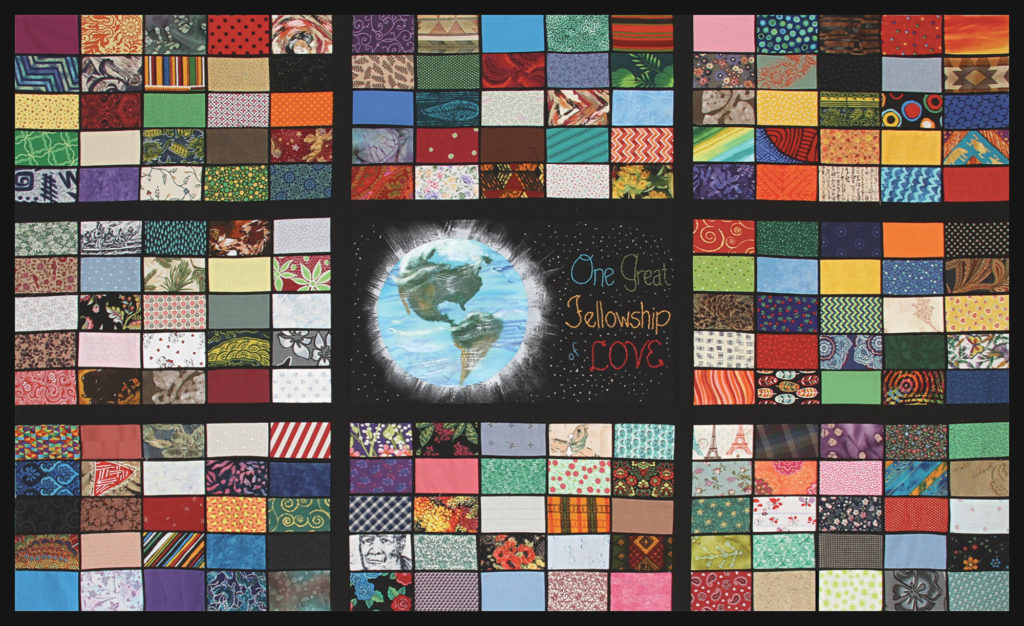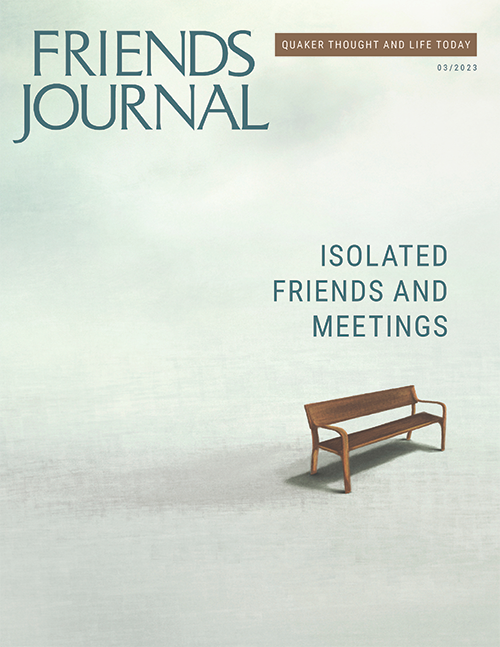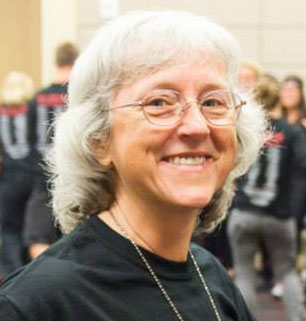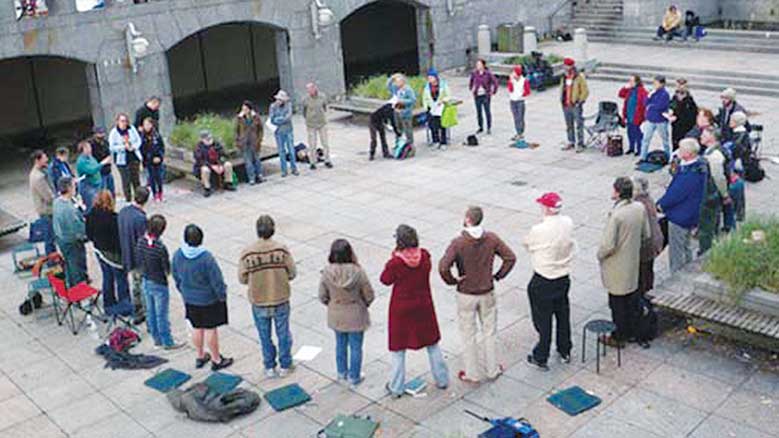Cultivating Sacred Space Online
In the spring of 2020, a Friend had a leading. She demurs: “It was just a personal need,” she says. But, as someone who’s been watching closely since that time, I’m inclined to call it “a leading” for two reasons: it nagged at her until she acted on it, and it has borne astonishing fruit.
The faithful Friend’s process went like this: There’s a pandemic starting, and it’s going to be challenging in unprecedented ways. I will need a new kind of spiritual support: something perhaps with the constancy of a spiritual nurture group and the exploratory quality of worship sharing but with more spiritual intimacy, and in a format that can reach across long distances. It should capture the pandemic’s opportunity to foster spiritual growth.
She invited about a dozen seasoned Friends she knew from around the United States to a videoconference to listen to one another and see what emerged. The result—shaped for nearly three years by a series of loving hearts and hands—is an ongoing practice that has become an essential spiritual discipline for many Friends. I’ve participated since the beginning and have served as its convener for over a year now, and I’ve witnessed its power again and again. It has some familiar characteristics, but those who attend agree that it’s a new and distinct form. We marvel at the openings that traditional Friends practice provides even in the age of Zoom. We discuss how this method might serve lofty goals: spiritual nurture for individuals, community building for meetings, the renewal of the Religious Society of Friends, and outreach beyond Friends to create the conditions for peace in the world.
We’ve been calling it “deep listening” or, in the words of my predecessor as convener, “small groups to speak and listen deeply.” Other descriptions have been suggested: “faithful listening”; “listening with love”; and for the acronym, “Friends ephemeral, expansive listening.” It seems to resist classification. I’m partial to a name proposed by a regular attender: “sacred listening.” What we have learned, those who’ve been meeting in this practice for years now, is that deliberate, focused listening invites Love in.
I’m partial to a name proposed by a regular attender: “sacred listening.” What we have learned, those who’ve been meeting in this practice for years now, is that deliberate, focused listening invites Love in.
The practice itself is very simple. As convener, I create a query each week, and a day before our meeting, I send it to an email list of about 60 Friends. At our weekly meeting time, Friends gather in an online videoconference for a little over an hour. We have ten minutes of waiting worship, a half hour of sharing about the query in pairs or groups of three or four, 15 or 20 minutes of reflection with all those present, and a few minutes of worship to close. Friends are welcome to come when they can and remain on the mailing list as long as they wish. Some attend every week and others perhaps twice a year. Usually the gathered group is between 15 and 20 people. The current list includes Friends on three continents and in six time zones.
The format is similar to worship sharing; what distinguishes it as unique is a handful of elements. One is the nature of the queries, which are written to be especially deeply searching and broadly welcoming. Another is that relatively little direction is given: the queries stand alone, without advices or accompanying texts. Moving between the whole group and smaller ones creates the space for deep connection within a wider community, and randomly composing the small groups allows Friends to experience this intimacy with different people each week.
But this explanation is akin to describing waiting worship as an hour of sitting in silence: it doesn’t even begin to convey the quality of the experience. That requires a deeper account of the hour.
I open the videoconference about ten minutes before our start time, and Friends gather gradually and welcome one another. There’s usually some chat about the weather or events in someone’s life, until I call us into worship. At this point, I’m often reminded of my favorite moment at Friends General Conference in-person gatherings, when a cavernous cafeteria bursting at the seams with Quakers shifts in one breath from cacophony to profound silence. Our opening worship is almost always unbroken by vocal ministry, and I close it gently.
The sacred space we’ve created extends into the breakout rooms. One Friend describes the moment of discovering her small group for the day as a sensation “like finding the prize in the Cracker Jack.” We gravitate naturally to customs familiar in worship sharing: each person speaks once before anyone speaks twice; we use time equitably; we speak from our own experience and hold others’ sharing in confidence; we receive without judging, correcting, or offering assistance. Most importantly, we set aside the habits of secular conversation. When we listen, we are not taking mental notes or planning how to respond; when we speak, we are not wondering how we look or sound. We are listening together, as much as we are listening to each other; we cultivate the experience of listening with our entire being. There’s no agenda or goal, no expectation of results. Instead we move into a state of consciousness in which we are safe and whole, a state of trust and repose like the space between breaths. We infuse this space with reverence for each other, for the project we’re undertaking together, for the generations of Friends before us who’ve led the way, and for the divine presence we invite.

Fellowship Quilt, made by the author from fabric donated by Friends who attend the Sacred Listening practice described in this article and Pendle Hill’s daily online worship. The painted and embroidered center panel is by Marilyn Pilkey; it reads, “One Great Fellowship of Love.” The quilt has grown one more layer since this photo was taken. The above dimensions are 39″ x 62″; the final version will be 53″ x 62″. Photo by John Margerum.
In the breakout room, we are large on one another’s screens. We look intently into each other’s eyes. We open our hearts to the message between the words. We listen with love. As one Friend put it, “We listen as God listens.” We return to silence between speakers, and in the silence we listen within for the words that will arise in us. For me, this is where this practice pivots from profound communion to a weekly miracle: when we listen to each other as God listens, I can hear God within. As I speak the words that come from that inner space, it is as if God is speaking to me through me. I learn that by listening to others in love, I become free to listen within myself in the same way.
When we return to the whole group to reflect on our experiences in the breakout rooms, Friends often express awe. People report breakthroughs to new spiritual understanding even when they had expected to have nothing to say about the query for the day. The mood in this part of the session varies depending on where the query has taken us, but there is always wonder and joy. Our closing worship often brings vocal ministry on this experience or on newly opened inspiration and direction.
The results of this practice are remarkable. As one Friend puts it, “We come to see each other through the eyes that God gave us. In everyday life, it may be difficult to see ourselves as God does; in this space, we can feel others seeing us through the eyes of Love.” For another Friend, it helps “bring my beliefs to my attention and add to them as I listen to others” because “we listen with love even when we may not fully agree with each other.”
Powerful community develops when we know one another in the eternal. One Friend describes herself as “a spiritual spelunker” and the other participants as “my veins of gold I have found by divine grace and mercy. Even when I can’t attend, all are ever-present.” But since a different group attends each week, we’re evoking the principle and sensation of community rather than creating a community in the way that, for example, monthly meetings do. This community is less about personal affinity than about, in another Friend’s words, “the web of life from which all things spring,” in which we experience “our very souls interconnected with the Presence or the Soul itself.”
We find, too, that cultivating these sensations for an hour a week makes them more available to us the rest of the time. One Friend whose goal is “to live in a prayerful, worshipful, truthful state” finds this “a gymnasium to train” toward that end. Another says that the sensation of unity we experience each week “is not limited to here; it’s all over the place, and we can be looking for it everywhere, even at the cash register at the market.” A regular attender notices that in daily life now “things come out of my mouth” unexpectedly: “You’re just constantly in a prayerful state that starts to bleed over into the way you actually have conversation. The process itself is shockingly transformative as well as the content being a way to progress spiritually.”
A broader message from this experiment is the potential in online meetings. We’ve been astonished to discover that this profound practice works not despite but because of its online framework.
One significant factor in such results is the presence of many deeply faithful and experienced Friends who cultivate and model the quality of listening that has always been central to Friends practice. Seasoned Friends also understand that we are all responsible for clerking the Truth into awareness. This practice works because of how it’s done, at least as much as because of what is done. The mailing list has grown mainly from invitations extended individually, largely through acquaintances made at online worship via Pendle Hill and Woodbrooke (research and conference centers in Wallingford, Pennsylvania, and Birmingham, England, respectively). It now includes newer as well as longtime Friends, and some from adjacent faith traditions who learn Friends practice by example. As one participant puts it, “Together we’ve created the precedent so that even a newcomer knows that true love and understanding really speak here.” Welcoming newcomers one or two at a time has helped to keep a balance between stability and dynamic growth.
A broader message from this experiment is the potential in online meetings. We’ve been astonished to discover that this profound practice works not despite but because of its online framework. As one Friend says, “There’s a boundlessness to this format” that facilitates our entrance into sacred space. Coming together online is a simpler and in some ways purer communion than meeting in physical space; it brings us quickly to essentials. Many participants express appreciation for the contact with a wider variety of Friends than they find locally or even nationally, and some say they feel able to share more freely than they do in person. As one put it with a humorous spin, “I know I’m not going to see these people in next week’s Property Committee meeting,” meaning that she can open herself to them in a space fully centered in spiritual communion without the complications of everyday life. Online, we settle quickly and easily. We get closer to each other’s faces than we would if we were together in person, and when we’re moved to show each other something, we may even virtually tour each other’s homes. Ironically, meeting from a distance brings us closer together. Far from being a temporary stopgap, videoconferencing is testimony to the fact that Friends practice is dependable always and everywhere.
A religion seeking continuing revelation is only as solid as its listening—both listening within for the still, small voice and listening to one another. The quality of our listening determines how fully we live our faith. Without awareness and regular practice, our daily life in the secular world may erode our disciplines, including that of listening. In this new custom, which is grown from old ones, new technology combines with methods that have always been at the heart of Friends practice to reconnect us with the power of profound listening. In the words of one participant, “I remain in awe of the simplicity of the process: showing up, being with, being present and open.”
Ann Jerome was interviewed for the March episode of our Quakers Today podcast.






This sounds absolutely wonderful. How do I join?
Diane McHale
Hi Diane, and thank you for your interest! Please send me an email (address in my bio under the article).